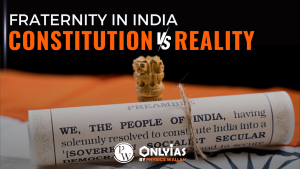
Context: This article of the Indian Express discusses how the concept of fraternity in India, as valued and mentioned in the Constitution, differs significantly from its historical and philosophical origins inspired from “How fraternity in India is different from the idea enshrined in the Constitution Premium”.
| Relevancy for Prelims: Historical underpinnings, evolution, features, amendments, significant provisions and basic structure and values of the Indian Constitution.
Relevancy for Mains: Indian Polity and Constitutional Values, Provisions and Significances.. |
Fraternity: The Cornerstone of National Unity and Empowerment”
- It refers to the idea of brotherhood and solidarity among citizens of a nation and inculcates a sense of unity, social harmony, and mutual respect among individuals.
- Philosopher Angel Puyol, in his book “Political Fraternity: Democracy beyond Freedom & Democracy,” argues that it is central to the emancipation and empowerment of people.
Origin of the Concept of Fraternity:
- Ancient Age: For Plato, the sharing of knowledge and love in the pursuit of wisdom are elements of fraternity.
- For Aristotle, justice and friendship among citizens were the most enduring features of the state and it became the idea of political fraternity.
- Medieval Age: During the Middle Ages, it was associated with religion, particularly within the context of Christian society in Europe.
- French Revolution: The concept of it became politically significant in 1789 in the triptych of ‘liberté, égalité, fraternité’.
- Evolution in Political Thought: It evolved from its origins in civic-political friendship in ancient Greece to religious contexts in medieval Europe, and finally to its revolutionary dimension in modern political thought.
Building Fraternity: The Role of Shared History and Integral Values in Social Cohesion
- Shared Past: In order to have fraternal bonding between individuals, they must have a shared past. This shared history should be amicable, free from ideological divisions rooted in social inequalities among different communities.
- Integral Value System: In community ties, as M. C. Williams in The Idea of Fraternity in America (1973) explains, an integral value system is the foundation of the idea of fraternity.
- It thrived within community ties, with a foundation built on integral values. It prioritized the collective over the individual, gradually giving way to religious morality and a ‘way of life.’
Fraternity in India: Advancing Equality through Affirmative Actions
- Constitutional Objective: The Indian Constitution recognizes the importance of it by considering it along with liberty and equality, as a foundational political objective.
- Affirmative Actions: The reservation system aims to establish equality among diverse social groups in terms of access to social and economic resources.
Challenges to Fraternity in India: Caste, Inequality, Discrimination
- Caste Division: India’s fraternal bonds face challenges due to its history of social hierarchies and caste divisions which are hindering the principles of equality and liberty.
- Social Inequalities: It is hindered if it merely glosses over existing social disparities. It cannot be built on social solidarity that ignores these differences.
- Religious Discrimination: The rhetoric of aggressive nationalism paints religious minorities as enemies and in result, they faced social and political discrimination.
- Fundamentalism: Any sort of fundamentalism (rigid and extreme thinking) hampers the true fraternal connections.
The Path Ahead to achieve Fraternity:
- Need to address caste dynamics to achieve it and to emerge in India as caste and the idea of political fraternity cannot coexist.
- Political conditioning is more effective than moral considerations alone to achieve it in its true sense.
- Amplification of affirmative actions like the reservation system are required to address fraternal issues.
- Strict actions and steps should be taken to bring equality and counter the notion of fundamentalism and religious discrimination.
Conclusion
As enshrined in the Constitution, it differs from its historical roots. Challenges like caste divisions, social inequalities, and religious discrimination hinder true fraternity. To achieve it, we must address caste dynamics, prioritize political conditioning, and strengthen affirmative actions. Additionally, promoting equality and countering fundamentalism are essential steps for fostering genuine fraternity in our diverse nation.
![]() 16 Sep 2023
16 Sep 2023

